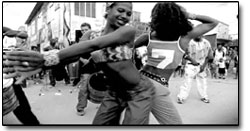| ||
The water is wide by Judith Reynolds The image of a boy flying a kite returns more than once in the moving new film “Favela Rising.” It poses the eternal question: what kind of a world do we want for our children? “Favela Rising” is one of the new documentaries (“City of God” and “Born into Brothels”) that plunges into the world’s most horrific slums to tell a tale. In this case, it is Vigário Geral, one of Rio de Janeiro’s 600 ghettos (favelas). Thanks largely to one charismatic leader, Anderson Sá, life in this favela is changing. We first meet Sá in a series of tightly framed interviews. He describes the poverty, violence and drug-driven economics of his urban hell. News footage illustrates the blood-soaked decade of the 1990s, culminating in a police massacre of innocents. The event triggered Sá’s transformation from drug trafficker into an agent for cultural change. Filmmaker Jeff Zimbalist and producer Matt Mochary, two Americans with social consciences, traveled to Brazil to meet Sá and profile his musical collective, Grupo Afro Reggae. Founded by Sá, another social activist, José Junior, and others, the collective recognized that every young person seeks identity in a group. Afro Reggae provided a new kind of group experience: joining a band,learning new skills and performing. It’s an age-old theme, one that is working, however modestly, in the snakepit of a Brazilian ghetto. Sá created a slum band that fused African, Brazilian and hip hop styles. The kaleidoscope genre has some ancestral roots in the music of Nigerian-born Fela Kuti, who created a similar hybrid in the 1970s. Combining percussion-heavy African rhythms with politically charged lyrics, the blend evolved in Brazil as Afro Reggae. In the 1990s, Sá’s band started giving free performances at local schools and in the community. So, the group offered percussion workshops to poor kids. One scene shows children with sticks beating out mixed rhythms on rusty gas cans and heavy plastic water jugs. Layer in singing, dancing, even kick-box dancing, and you’ve got a lively communal experience.
For all the energy generated in the big performances, the most endearing moment focuses on one toddler wandering down a dismal alley beating on a makeshift drum. Shot with digital video cameras, the documentary is a bit bumpy. Adding news footage underscores ghetto reality: overcrowding, decay, drugs and police brutality. Only once do the filmmakers cross a documentary line to show one of the crew members, a fearful translator. The point about dangerous conditions has been made, but at a cost. Another question: With all the great music available, why do the filmmakers slip occasionally into visual and aural reverie? They substitute semi-classical music to create a mythical halo. Over the top. The film reaches a natural climax as the Afro Reggae movement begins to succeed. Sá and his collective attract more and more young people away from crime and into music. They even penetrate some of the other ghettos, a territorial line one does not cross without serious consequences. The band achieves a record contract and begins to attract world attention. Then life intrudes. In what feels like an epilogue, the film enters new territory. A mysterious water motif that opens the film takes on new meaning, and the storytellers have a new tale. That shift won’t be given away here. It’s up to viewers to decide whether the filmmakers remain true to the documentarian’s credo – present what you find. Or do they cross a bridge into yet another story? •
|


